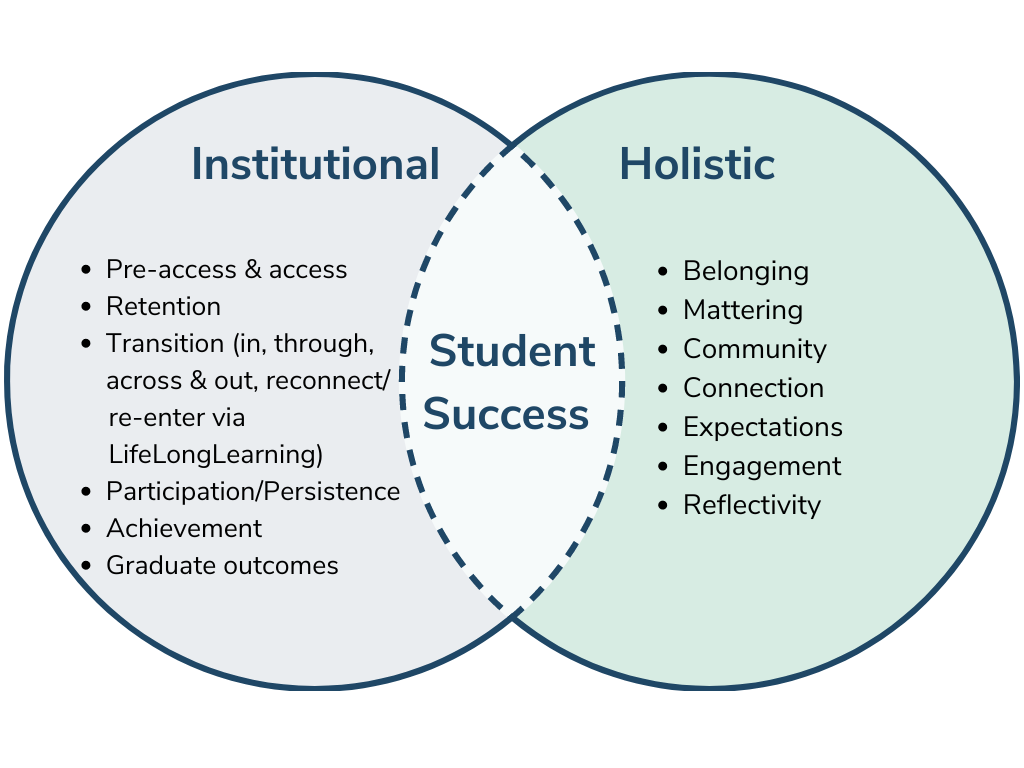How does Global Forum for Student Success define student success?
No single definition of this term has been adopted internationally, but “student success” most often is associated with factors such as academic achievement, engagement in certain high-impact educational activities, self-perceived student satisfaction with their higher education experiences, persistence toward degree completion/attainment, and acquisition of intended knowledge, skill, and capacities (Kuh et al. 2011).
The global perspective of student success takes into account two categories:
- Institution-centric, employability-oriented approach to success
- Student-centered and holistic vision for success
Institution-centric, employability-oriented:
- Pre-access and access
- Retention
- Transition (eg, in, through, across & out)
- Participation/ Persistence
- Achievement/ Graduate outcomes
A more holistic and student-centered vision:
- Belonging
- Mattering
- Community
- Connection
- Expectations
- Engagement
- Reflectivity

Student success is about the learner – as an individual, with a specific educational legacy, someone who is learning to think about themselves in relation to their subject, a person likely with multiple identities, with different expectations, with a different approach to learning as a cohort, and with their own roles and responsibilities.
References
(e.g., National Forum, 2019; O’Shea and Delahunty, 2018; José Sá, 2020).
The Global Design Principles for Student Success:
The six Global Design Principles provide institutions with a means and model for evaluating and improving student learning and success. The Global Design Principles make frequent and intentional use of the term “transformation” and variations thereof.
For purposes of the work, “transformation” is defined as the result of a process through which an institution assures that all students can graduate. Shaped by intentional forms of innovation, transformation requires making significant strides toward eliminating demographics such as family income, geography / postal code, gender, race/ethnicity, etc. as the best predictors of student success. Transformational postsecondary institutions understand that they bear significant responsibility for helping students meet the high expectations set by the institution, and that meeting these expectations should not be dependent on privileges students have accrued through birth or other external factors.
As a continuous-improvement approach, the Global Design Principles for Student Success enable institutions to both recognize their strengths as well as identify areas for improvement. Providing general guidelines for intentional design of the postsecondary experience, the Global Design Principles rest on four assumptions:
A. The academic mission of an institution is preeminent.
B. Current rates of success in the postsecondary experience are unacceptably low and must be improved, especially for students who are first-generation, low-income, and members of historic and present-day underserved racial and ethnic groups.
C. Institutions committed to transformation eliminate inequitable outcomes while maintaining high curricular and co-curricular expectations.
D. Continuous use of evidence provides validation of institutional strengths and opportunities for improvement of the foundational postsecondary experience.
The Global Design Principles for Student Success (Global Design Principles) are based on the Gardner Institute’s Principles for Institutional Transformation. Drawing on Gardner Institute resources, the Global Design Principles have been developed with input from members of the Global Forum for Student Success. The Global Design Principles may be used, with attribution, by any non-profit postsecondary institution seeking to improve student outcomes. The Global Design Principles may not be used for commercial purposes, nor altered without prior written permission from the Gardner Institute.
